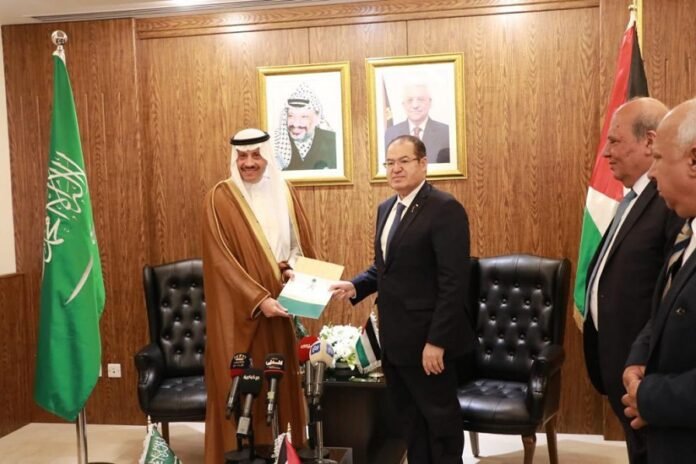The first ambassador appointed by Saudi Arabia to Palestine, Naif bin Bandar Al-Saud, presented on Saturday his letter of credentials to the Palestinian authorities, Anadolu reports.
Ambassador Al-Saud delivered the letter of credentials to Majdi Al-Khalidi, advisor to President Mahmoud Abbas for diplomatic affairs, at the Palestinian Embassy in Jordan, the official Palestinian news agency WAFA reported.
The original credentials will be handed over to the Palestinian president soon.
Al-Saud will serve as the non-resident ambassador of Saudi Arabia to Palestine.
Khalidi said this step would contribute to strengthening the bonds between the two brotherly peoples and countries.
Al-Saud previously served as the Saudi ambassador to Amman.
In a move coinciding with the increase in talk about Saudi Arabia reaching a normalization agreement with Israel under American auspices, Riyadh announced, on Saturday, the appointment of a non-resident ambassador to the Palestinian territories for the first time, in a move aimed at sending a “clear” message to Washington and Israel regarding Saudi demands related to its approval of normalization. According to observers. Earlier, on Saturday, the Saudi embassy in Jordan announced on the X platform (formerly Twitter) that the current Saudi ambassador to Jordan, Nayef Al-Sudairi, will assume the new position in addition to the position of Consul General in the city of Jerusalem.
Al-Sudairy said in statements carried by the Saudi Al-Ekhbariya channel that this is an “important step,” stressing the desire of King Salman and Crown Prince Mohammed bin Salman to “strengthen relations with the brothers in the State of Palestine… and give them an official boost in all fields.”
On the other hand, Palestinian officials said that they had received a copy of the credentials of the first Saudi ambassador.
The official Palestinian News Agency (WAFA) said on its official website that the Palestinian President’s Advisor for Diplomatic Affairs, Majdi Al-Khalidi, received a copy of the credentials of Ambassador Nayef Al-Sudairi as “Ambassador Extraordinary and Plenipotentiary of the Custodian of the Two Holy Mosques, King of the Kingdom of Saudi Arabia, to the State of Palestine and Consul General of the Kingdom in Jerusalem.”
capital of the State of Palestine. The agency stated that this came during Al-Khalidi’s reception of Ambassador Al-Sudairi today, Saturday, at the headquarters of the Palestinian embassy in Jordan.
Traditionally, the Embassy of the Kingdom of Saudi Arabia in Amman handles the file of the Palestinian territories. Saudi Arabia continues to defend the Palestinian cause and has not yet accepted the establishment of official relations with Israel, but the United States seeks to sponsor what could be a historic agreement in the Middle East, which may include announcing the normalization of relations between Saudi Arabia and Israel.
Saudi Arabia does not recognize Israel and did not join the “Abraham Accords” concluded in 2020 with the mediation of the United States, according to which the Hebrew state established official relations with the United Arab Emirates and Bahrain. In this context, Saudi political researcher Ahmed Al-Shehri says that the Saudi move aims to send a message to Israel and the United States to the effect that “there is no normalization with Israel without the establishment of an independent Palestinian state with East Jerusalem as its capital.”
Al-Shehri adds to the “Al-Hurra” website that “Riyadh does not mind establishing a relationship with Israel, provided that the Israelis make real concessions, foremost of which is the recognition of the State of Palestine on the 67 borders, according to the Arab initiative.”
And he continues, “This matter is not difficult if there is a real will and desire on the part of Washington or Israel” in this regard, stressing at the same time that “there is no peace without a price.”
Al-Shehri also stressed that “the step aims to consolidate recognition of the State of Palestine and activate international resolutions regarding it,” calling on all Arab countries to follow his country’s example. Riyadh repeatedly says that it will adhere to the decades-old position of the Arab League not to establish formal relations with Israel until the conflict with the Palestinians is resolved. But in recent months, Riyadh and Washington have held talks about Saudi conditions for progress toward normalization, including security guarantees and assistance in building a civilian nuclear program with uranium enrichment capacity, according to officials familiar with the content of the meetings.
However, Saudi political analyst Saad bin Omar rules out any normalization agreement with Israel soon for several reasons, including that Washington has been too late to give the Palestinians what they are asking for.
In his interview with Al-Hurra, Ben Omar indicated that Washington’s dealings with Saudi Arabia at the strategic level or the issue of armaments and other issues was not at the required level. Ben Omar stresses that “the solution to the Palestinian issue in accordance with the Arab initiative is the first guarantee that Saudi Arabia demands in order to move forward on the issue of normalization, and then Saudi-American cooperation comes second.”
Bin Omar said that Saudi Arabia’s appointment of an extraordinary ambassador to Palestine “is in favor of advancing the issue of international recognition of the Palestinians and gives a strong impetus towards the Palestinian state that is hoped to be established.”
The White House announced, on Wednesday, that there is no agreed framework for reaching an agreement under which Saudi Arabia will recognize Israel, and that many talks must be held before such an agreement is signed.
This announcement came hours after The Wall Street Journal published a report in which it said that the United States and Saudi Arabia had agreed on the broad lines of the normalization agreement with Israel. But national security spokesman John Kirby played down the report, noting in a news briefing that “there’s still a lot of discussion going on here.” “There is no agreement on a set of negotiations and there is no agreed framework for reaching normalization or any of the other security considerations that we and our friends in the region have,” he added.


